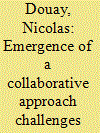| Srl | Item |
| 1 |
ID:
094052


|
|
|
|
|
| Publication |
2010.
|
| Summary/Abstract |
Urban planning in Hong Kong is being transformed with the expansion of civil society and the development of various community movements.They are posing a challenge to current urban planning practices and throwing up conditions for a collaborative approach to urban planning, fashioning alternative strategies.
|
|
|
|
|
|
|
|
|
|
|
|
|
|
|
|
| 2 |
ID:
085905


|
|
|
|
|
| Publication |
2008.
|
| Summary/Abstract |
Since the 1950s, Shangai has undergone major changes, reflected in the practice of urban planning, which has been influenced by different Western theories.Strategic and collaborative currents as well as the concept of sustainable developement have helped reformulate urban planning styles.Does this renewal mean the emergence of an original model of Chinese urban planning,notably with the concept of harmonious urbanisation?
|
|
|
|
|
|
|
|
|
|
|
|
|
|
|
|
| 3 |
ID:
152171


|
|
|
|
|
| Summary/Abstract |
The aim of this issue is to observe the role played by spatial planning and urban planning in contemporary Chinese changes, and to identify theoretical and practical transformations by focusing on the concepts, actors, and projects of urban planning. First, it is a matter of questioning the evolution of the styles of planning and of the concepts that underpin action. (...) In the Chinese context, this raises the question of going beyond the traditional planning model and of the advent of new styles of planning that could become more strategic in order to follow neoliberal prescriptions, more collaborative in order to better build consensus among actors, more sustainable in order to respond to environmental emergencies (...). Secondly, it is a matter of observing the concrete modalities of these voluntary transformations of space. (...) The interest of this dossier is to try to cross-reference these dimensions in order to provide a more detailed understanding of this central element in contemporary Chinese transformations.
|
|
|
|
|
|
|
|
|
|
|
|
|
|
|
|